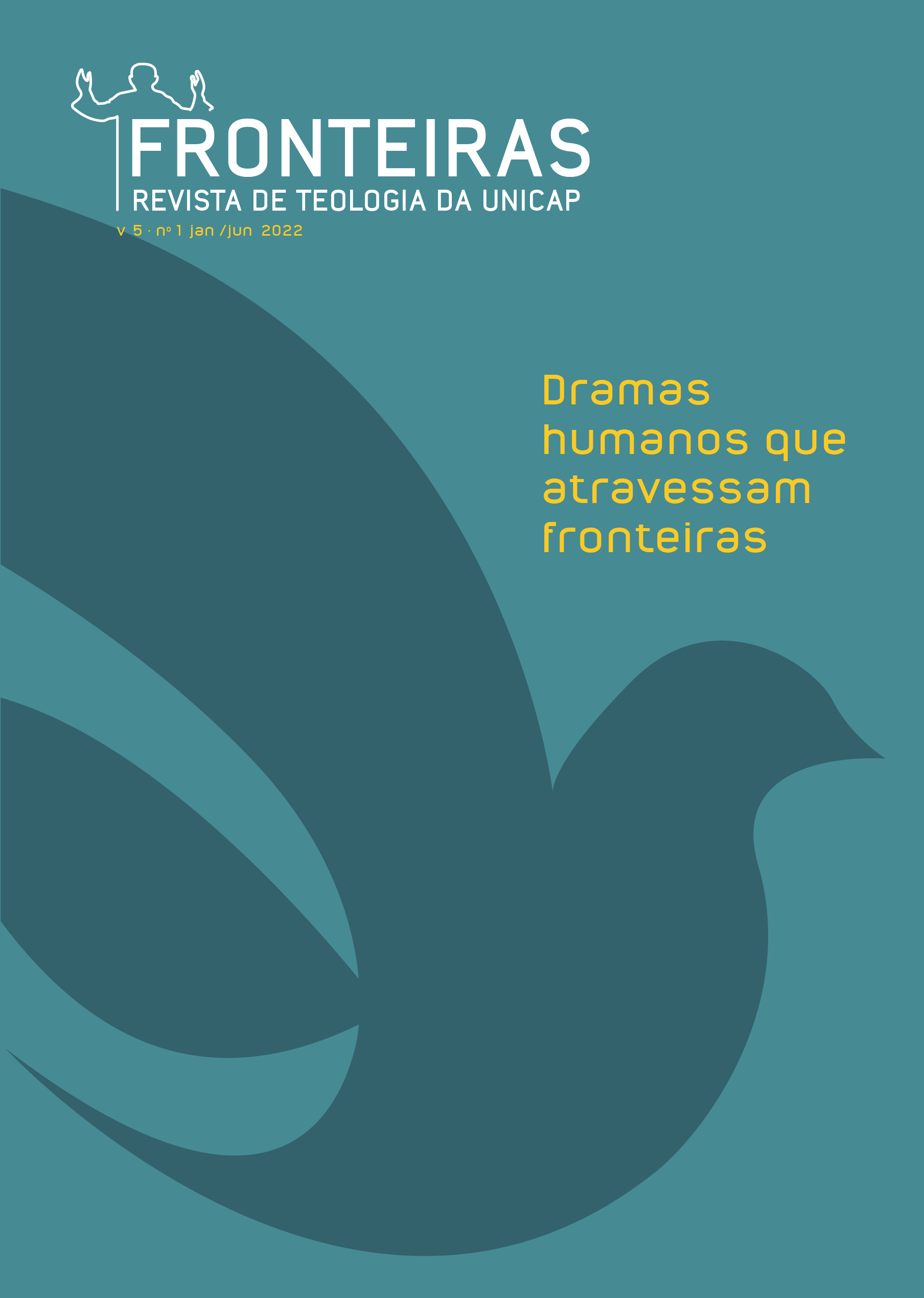Analysis of Deut 6:1-13:
the love of the Lord and the observance of the shemá
DOI:
https://doi.org/10.25247/2595-3788.2022.v5n1.p203-226Keywords:
Deuteronomy, Shemah Israel, Covenant, Love to the Lord, Prayerful ReadingAbstract
The book of Deuteronomy is a pedagogical project, concerned with the formation of future generations of the children of Israel, born in the desert who did not experience the covenant established on Mount Sinai. In this way, Moses, on the steppes of Moab, offers the new Israel the possibility of renewing this covenant, which, if observed, will allow the new Israel to enter, possess and remain in the land that YHWH will give to him: a land with wells, vineyards and olive trees. At the light of this event, the present article aims to develop, based on the ancient method of reading Sacred Scripture, called Prayerful Reading of the Bible, the analysis of Dt 6,1-13 structured in: introduction; theme setting; segmented text; literary context and answer to four questions: what does the text say to the listener-reader? What proposals does the text make to the listener-reader? What does the text enable the listener-reader to say to God in prayer? What decisions does the text lead the listener-reader to make? Some final considerations close the analysis.
Downloads
References
ANDOR, Josiah B. Wholistic Education and the Shema Creed (Deuteronomy 6:4-9). Humanities and Social Sciences, vol. 4, no. 27, p. 143-148, jan. 2014.
BRUEGGEMANN, Walter. Deuteronomy. Nashville: Abingdon Press, 2001.
CEOLIN, Nelvi Jorge. Ouvir e Amar A Javé: Dt 6,4-9: Um caminho para a cultura de paz. (Dissertação de Mestrado). Faculdade de Teologia da Pontifícia Universidade Católica do Rio Grande do Sul. Porto Alegre, 2006.
DE LEÓN AZCÁRATE, Juan Luis. DEUTERONOMIO: Comentarios a la Nueva Biblia de Jerusalén. España: Editorial Desclée De Brouwer, 2009.
EICHRODT, Walther. Teologia do Antigo Testamento [Traduzido por Cláudio J. A. Rodrigues]. São Paulo: Hagnos, 2004. (Sugiro retirar o tradutor, pois evita errar em relação aos demais livros nas outras línguas)
FABRIS, Rogério de. Antropologia semítica: uma análise exegética da perícope de Dt 6,1-9, com aproximação ao vocábulo lev. (Dissertação de mestrado). Universidade Metodista de São Paulo. São Bernardo do Campo, 2014.
FERNANDES, Leonardo A. A atualidade do “hoje” em Dt 26,26-19. Pistis & Praxis, Curitiba, v. 11, n. 2, p. 378-398, maio/ago. 2019.
FERNANDES, Leonardo A. Reflexão sobre o contexto e a singularidade de Dt 30,11-14. Revista de Cultura Religiosa, Ano XXVIII, no. 97, p. 110-126, set./dez. 2020.
FOUILLOUX, Danielle et alii. Dicionário Cultural da Bíblia [Traduzido por Marcos Bagno]. São Paulo: Loyola, 1998, p. 243.
FRIZZO, Antônio Carlos. O Shemá, Israel em Dt 6,4-9: O mandamento de Deus contra a idolatria. Ano IX, no.34. Revista cultura Teológica, p. 99-109, jan./mar. 2001.
FUHRMANN, Justin M. Deuteronomy 6-8 and the History of Interpretation: An Exposition on the First Two Commandments. Journal of the evangelical theological society. vol. 53, no. 1, p. 37–63, mar. 2010.
GARCÍA LÓPEZ, Félix. EL DEUTERONOMIO: una ley predicada. Estella/Navarra: Editorial Verbo Divino, 1989.
HENRY, Matthew. Commentary on the Whole Bible (Genesis to Deuteronomy, vol. I). Grand Rapids/Michigan: Christian Classics Ethereal Library, 2000.
JANZEN, J. Gerald. On the Most Important Word in the Shema (Deuteronomy VI 4-5). Vetus Testamentum, vol. 37, Fasc. 3, p. 280-300, jul. 1987.
KATTAN GRIBETZ, Sarit. The Shema in the Second Temple Period: A Reconsideration. Journal of Ancient Judaism, vol. 6, no.1, p.58-84, out. 2015.
LASOR, William S.; HUBBARD, David A.; BUSH, Frederic W. Introdução ao Antigo Testamento [Traduzido por Lucy Yamakami]. São Paulo: Vida Nova, 1999.
MACDONALD, Nathan. The Date of the Shema (Deuteronomy 6:4–5). Journal of Biblical Literature, vol. 136, no. 4, p. 765-782, winter. 2017.
NAKANOSE, Shigeyuki. Para entender el libro del Deuteronomio: ¿Una ley a favor de la vida? Ribla, no. 23, p. 168-184. 1996.
OLIVEIRA CRUZ, Joerley Orlando de. Javé é o único (’ehad) em Dt 6,4-9. (Dissertação de Mestrado). Universidade Metodista de São Paulo: São Bernardo do Campo, 2011.
ORTEGA CORTÉS, María Catalina; SIERRA URREA, Aurora Patricia. Claves Teologías y Pedagógicas del Shemá Israel Dt. 6, 4-9 como fundamento de un ministerio laical. (Licenciatura en Teología). Universitaria Agustiniana, Bogotá, 2018.
PAGANINI, Simone. Deuteronomio: nuova versione, introduzione e comento. Milano: Paoline, 2011.
PINTO, Leonardo Pessoa da Silva. O Shemá e a devoção a uma só divindade. Horizonte, Belo Horizonte, vol. 17, no. 52, p. 20-42, jan./abr. 2019.
REINAR, Haidi Wehrmann. A figura Paterna na família em relação a Deuteronômio 6.4-9. Vox Scripturae – Revista Teológica Brasileira, vol. XVIII, no. 1, p. 152-205, maio. 2010.
RÖMER, Thomas. A chamada história deuteronomista: introdução sociológica, histórica e literária [Traduzido por Gentil Avelino Titton]. Petrópolis/RJ: Vozes, 2008.
RÖMER, Thomas. A Origem de Javé: O Deus de Israel e seu nome [Traduzido por Margarida Maria Cichelli Oliveira]. São Paulo: Paulus, 2016.
RÜGER, Hans Peter; KITTEL, Rudolf.; ZIEGLER, Joseph. (Cooper.); ELLIGER, Karl; RUDOLPH, Wilhelm (Edidit). Biblia hebraica stuttgartensia. Stuttgart: Deutsche Bibelstiftung, 1997.
SCHMIDT, Werner H. Introdução ao Antigo Testamento. [Traduzido por Annemarie Höhn I], 3. ed. São Leopoldo: Sinodal, 2004.
SIMON, A. Ishola. The Shema Injunction and the Challenge for Children Ministry. South Asian Research Journal of Arts, Language and Literature, vol. 1, no. 2, p. 44-48, sep./oct. 2019.
THOMPSON, John A. Deuteronômio: introdução e comentário [Traduzido por Carlos Osvaldo Pinto]. São Paulo: Vida Nova/Mundo Cristão, 1982.
VEIJOLA, Timo. Höre Israel! Der sinn und hintergrund von Deuteronomium VI 4-9. Vetus Testamentum, vol. 42, Fasc. 4, p. 528-541, oct. 1992.
VON RAD, Gerhard. Teologia do Antigo Testamento, vols.1 e 2 [Traduzido por Francisco Catão]. 2. ed. São Paulo: Aste/Targumim, 1976.
WESTERMAN, Claus. נֶפֶשׁ nӕfӕš Alma, in: JENNI, Ernst.; WESTERMANN, Claus. Diccionario Teológico Manual del Antiguo Testamento (Tomo II). Madrid: Ediciones Cristiandad, 1985, colunas 102-133.
WORK, Telford. Deuteronomy. Grand Rapids: Michigan: Brazos Press, 2009.
Downloads
Published
Issue
Section
License
Copyright (c) 2022 Leonardo Agostini Fernandes, Vilson José da Silva

This work is licensed under a Creative Commons Attribution 4.0 International License.
Autores que publicam nesta revista concordam com os seguintes termos:
- Autores mantém os direitos autorais e concedem à Fronteiras - Revista de Teologia da Unicap o direito de primeira publicação, com o trabalho simultaneamente licenciado sob a Licença Creative Commons Attribution que permite o compartilhamento do trabalho com reconhecimento da autoria e publicação inicial nesta Revista.
- Autores têm autorização para assumir contratos adicionais separadamente, para distribuição não-exclusiva da versão do trabalho publicada nesta revista (ex.: publicar em repositório institucional ou como capítulo de livro), desde que reconheça e indique a autoria e a publicação inicial nesta Revista.
- Autores têm permissão e são estimulados a publicar e distribuir seu trabalho online (ex.: em repositórios institucionais ou na sua página pessoal) a qualquer momento depois da conclusão de todo processo editorial, já que isso pode gerar alterações produtivas, bem como aumentar o impacto e a citação do trabalho publicado (Veja O Efeito do Acesso Livre).






















